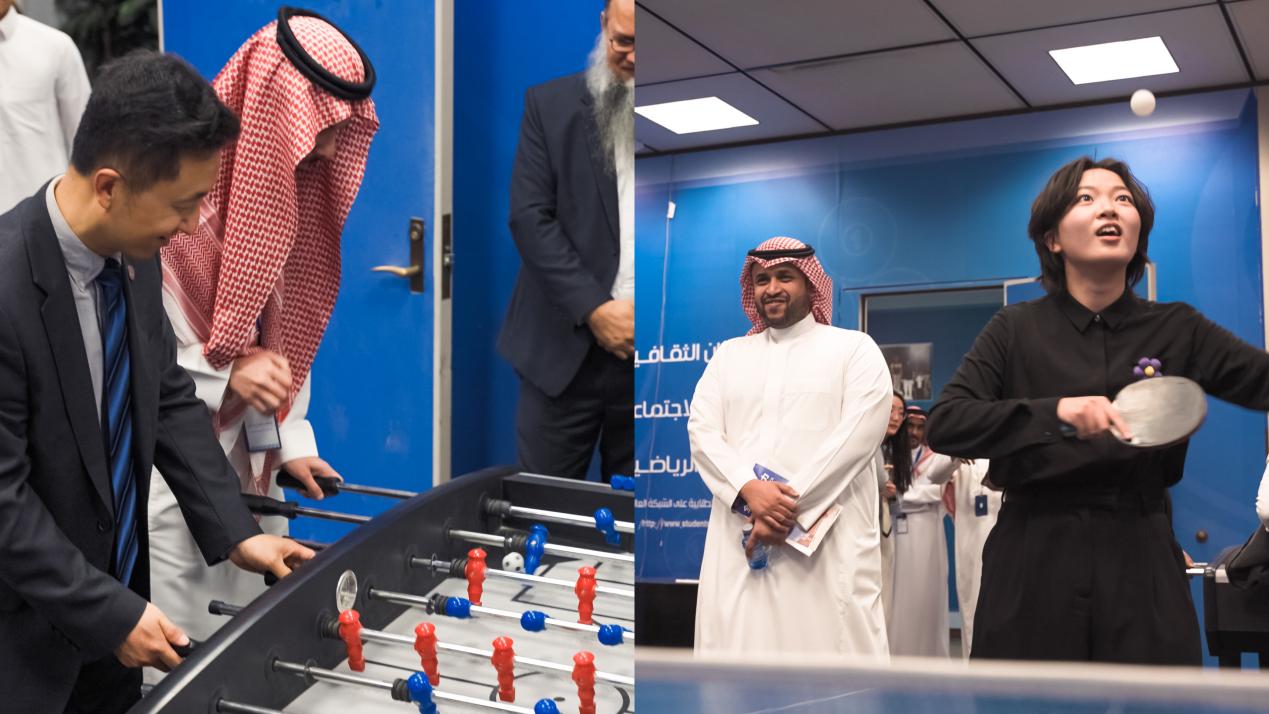By Zou Shuo | China Daily
The horizon was reddish when she flew into the sandy expanse of Riyadh's outskirts, leaving the Indian Ocean far behind. In the distance, the skyline of the city consisted of domes, minarets and pyramids. A sense of unfamiliarity enveloped her.
That was the first impression that Wang Yixiao — an undergraduate student from Tsinghua University — had of Saudi Arabia.

Tsinghua University student Tao Tianye plays table tennis with her peers at King Saud University in Riyadh, Saudi Arabia. CHINA DAILY
Her first encounter with Arabian culture was during the 10-hour flight from Beijing to Riyadh, as she met flight attendants wearing hijabs, had very sweet in-flight meals and was given tiny cloth cleaning bags embellished with complex traditional patterns, she said.
She was one of 12 students from Tsinghua who were on a practical training course focusing on global competence development and intercultural communication, visiting Saudi Arabia from Feb 7 to 16.
Led by Hu Yu, director of the Institute for Cultural Activity at Tsinghua University, and Shi Zhidan, assistant director of the Center for Global Competence Development at Tsinghua University, the students visited two elite Saudi Arabian higher education institutions, King Saud University in Riyadh and King Abdul Aziz University in Jeddah.
Located in north Riyadh, KSU is the first comprehensive university in Saudi Arabia.
Abdullah Yahya is an undergraduate student at KSU majoring in journalism who is interested in Chinese culture.
When talking about popular social media used by Chinese youth, Zhao Jia, a Tsinghua postgraduate student in journalism, recommended WeChat to her Saudi peer. With Zhao's help, Yahya managed to create a new WeChat account and added Zhao as his first WeChat friend.
Yahya said he had only heard about China from social media and in the news, and he was very happy to have the opportunity to meet young students in person.
"For us, China is a novel country, and this kind of cross-cultural communication can help us learn more about Chinese society and make some Chinese friends," he said.
The second university they visited, KAU, is a highly prestigious institution in Jeddah, the most significant commercial hub in Saudi Arabia. It is renowned for its pioneering study programs in Chinese Studies.
Ma Feiyang, a third-year undergraduate student from the School of Economics and Management at Tsinghua University, said the report of the 20th Communist Party of China National Congress stressed the need to further strengthen cultural exchanges and mutual learning.
"You have to chase for knowledge, even as far as Arabia," he said, paraphrasing an Arabic proverb that "You have to chase for knowledge, even as far as China", "The essence of our trip is to appreciate each other's civilizations."
Two senior students at the department of Chinese studies at KAU, Wesal Abdulrahman Alqarni and Ahmed Sulaiman Alhayfani, attended the discussion with the Tsinghua students. They both came in the top three in the first "Chinese Bridge" competition held last year in Saudi Arabia, a Chinese-language proficiency competition for foreign students.
Alqarni quoted a famed Tang Dynasty (618-907) poem in her speech: "A bosom buddy afar brings a distant land near." She hoped to have an opportunity to study in Beijing in the future.
The students also talked about the different foods of the two countries.
"I was going to eat hotpot yesterday, but I do not know how to order food at a Chinese restaurant, so I had to skip it," Saudi student Wajan Bahmim said as she "complained" about the complexity of Chinese food. "Next time I have to eat with my Chinese friends."
Students at KAU said it was the first time they had met Chinese students in person, despite previous online activities with some Chinese universities.
The group members introduced China's geography, language, history and popular culture to their Saudi counterparts, and they said they were looking forward to coming to China to experience the country's development.
Source: China Daily

